Introduction
Wouldn’t it be marvelous if everyone working in an organization expressed what they felt about each other—without fearing negative consequences?
No, not from a place of anger, hatred, or discontent.
But from a place of genuine care.
That’s what radical candor is at its most boiled down version.
And any organization—that cares for its people—must consider making radical candor a living, breathing phenomenon among its teams.
About Radical Candor
Kim Scott crystallized the concept of radical candor in her book by the same name.
She drew from her professional experiences, and the book was an instant hit among industry leaders.
Kim once ran a company where she wanted people to be passionate and happy about their work.
But after a few years, she had to close shop. This experience made her realize just how difficult creating a healthy, fulfilling work culture could be.
When she got a job at Google, Kim noticed that the type of culture she was trying to build already existed there.
So, she started observing the enabling factors at Google, and then in other teams across industries.
And her research eventually culminated into the book.
Kim briefly explains the primary concepts discussed in the book, Radical Candor.
Why Is It Important For A Company To Embrace Radical Candor?
The concept's main purpose is to build teams where members help each other grow; teams that are:
- Productive
- Efficient
- Caring
- Empathetic
But it isn’t as simple as all that where the rubber meets the road.
Kim devised four quadrants, each with a particular set of behaviors.
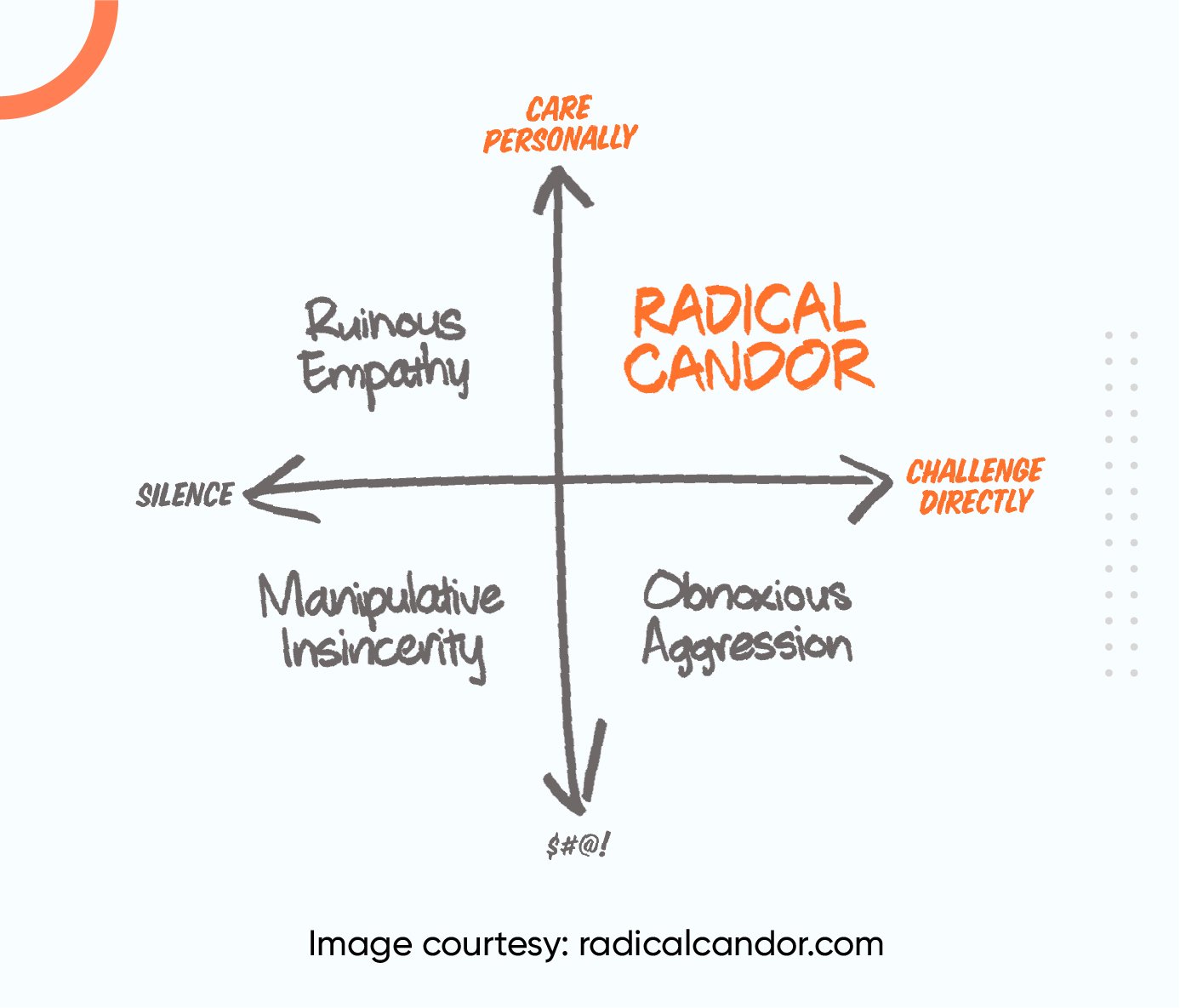
Here’s the interesting thing.
One can simultaneously exhibit varying behaviors associated with multiple quadrants—with different people.
And we’ve seen this happening in our lives. X is always cozy and accommodating with their manager. But when it comes to you, it’s the opposite.
Radical candor is the quadrant that teams and organizations should aim for.
It's an inseparable combination of guidance and kind, clear, specific, and sincere feedback.
A leader must possess these two traits to make radical candor a reality within their team:
Caring Personally
They genuinely care for the growth and overall well-being of their people. Not for show or to get promoted.
The leader shows their care by investing time and energy in building authentic relationships.
Challenging Directly
The leader is able to share specific feedback directly with the team members about their weak points.
Again, this is not an opportunity to lash out.
The feedback here is an act of kindness, and it comes after establishing that a leader truly cares for their team members’ growth.

And This Is Why We Strive To Be Radically Candid In Everything We Do
At Axelerant, a team member's first introduction to the book happens before their first day at work.
Team members at @axelerant are encouraged to read @kimballscott 's book 'Radical Candor'.📚📖
— Kanika Bhatia (@kanika2610) June 30, 2022
It has begun to alter my perception of what it means to be a good boss/leader. I strongly recommend all working professionals to read it.#LifeAtAxelerant#RadicalCandor pic.twitter.com/xOpgXAD06H
"It's a way of thinking and behaving we want our team members to cultivate," said Ankur Gupta, Axelerant CEO.
To Avoid A Toxic Work Culture
The oft-neglected reason a leader would want radical candor as a part of their team is to avoid the other three quadrants:
- Obnoxious aggression: Where leaders resort to rude behavior, blame, and confrontation.
- Manipulative insincerity: One pretends to care and like, but in reality, only wants to manipulate and put down others.
- Ruinous empathy: Most difficult to catch; one avoids sharing feedback until there's no scope for improvement.
Foster Fearlessness
"Fear kills growth, creativity, and integrity," said Hussain Abbas, Director of PHP & Drupal Services.
"In my previous organization we were afraid to speak up or share feedback with senior colleagues," said an Axelerant team member wishing to remain anonymous.
It’s no wonder that people fear speaking up. We live in a world where the CEO of one of the top tech companies openly fires their team member for disagreeing with them.
I have spent ~6yrs working on Twitter for Android and can say this is wrong. https://t.co/sh30ZxpD0N
— Eric Frohnhoefer @ 🏡 (@EricFrohnhoefer) November 13, 2022
One of Axelerant's core values is openness, and people are encouraged to speak up.
Sharing views, feelings, ideas, and feedback is a part of our work.
And Build Teams That Care Equally About Work And The People Doing It
When it's all about the work in a team, quite paradoxically, the work quality goes south, eventually.
At the core of radical candor sits care. Without it, the whole thing falls apart like a deck of cards.
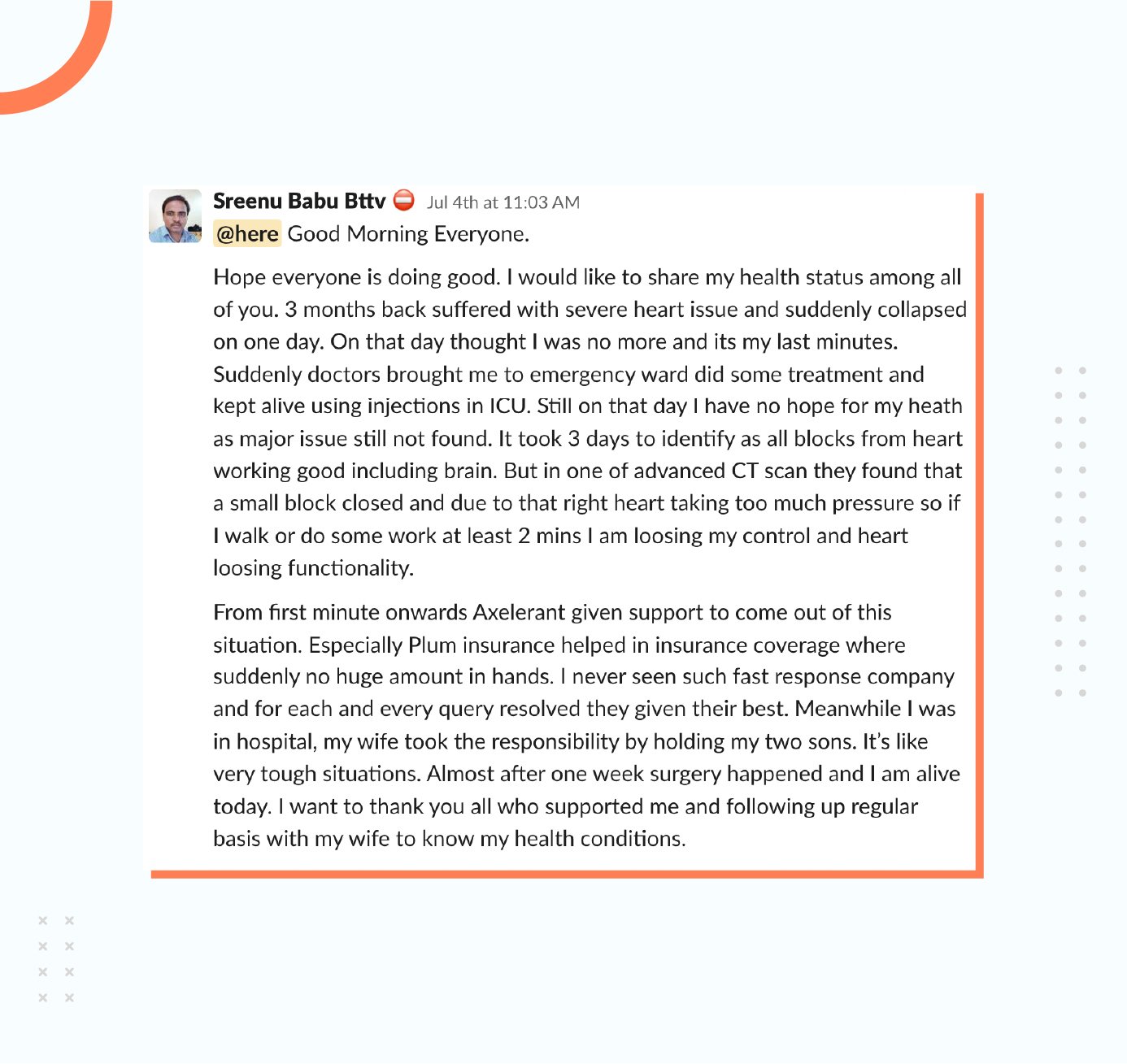
"When people know that they are only worth as much as their output in a company, they become unenthusiastic about their work," said Lydia Solomon, Axelerant Frontend Engineer.
By Making Radical Candor A Part Of Every Thing That Makes Axelerant Special
Bringing a concept like radical candor alive within teams takes time and effort.
At Axelerant, we have set up processes so that the two main attributes of radical candor—caring personally and challenging directly—become a part of our culture, as essential as the work itself.
Through Performance Coaching
We can’t expect people to read, absorb, and follow the ideas written in the book just because it’s a part of their welcome kit.
People need training, guidance, and support to make it happen.
Thankfully, that's precisely what Axelerant's coaching team does. They help teams and the people in it become better versions of themselves.
Performance Coach Nanditha Krishnan kicked off the training with two valuable coaching sessions.
Every team member has an assigned coach.
They can reach out to them to tackle real-life challenges, like:
- Processing hard feedback
- Dealing with personal and professional challenges
- Navigating through an emotionally charged phase
By Openly Recognizing Our Peers
Most people need something more than getting paid for their work to continue thriving in it.
And that something is recognition.
Think about it: would you even know the industry titans if they weren’t recognized by others at some point in their careers?
At Axelerant, we proudly recognize team members for even the smallest things people take for granted at work.
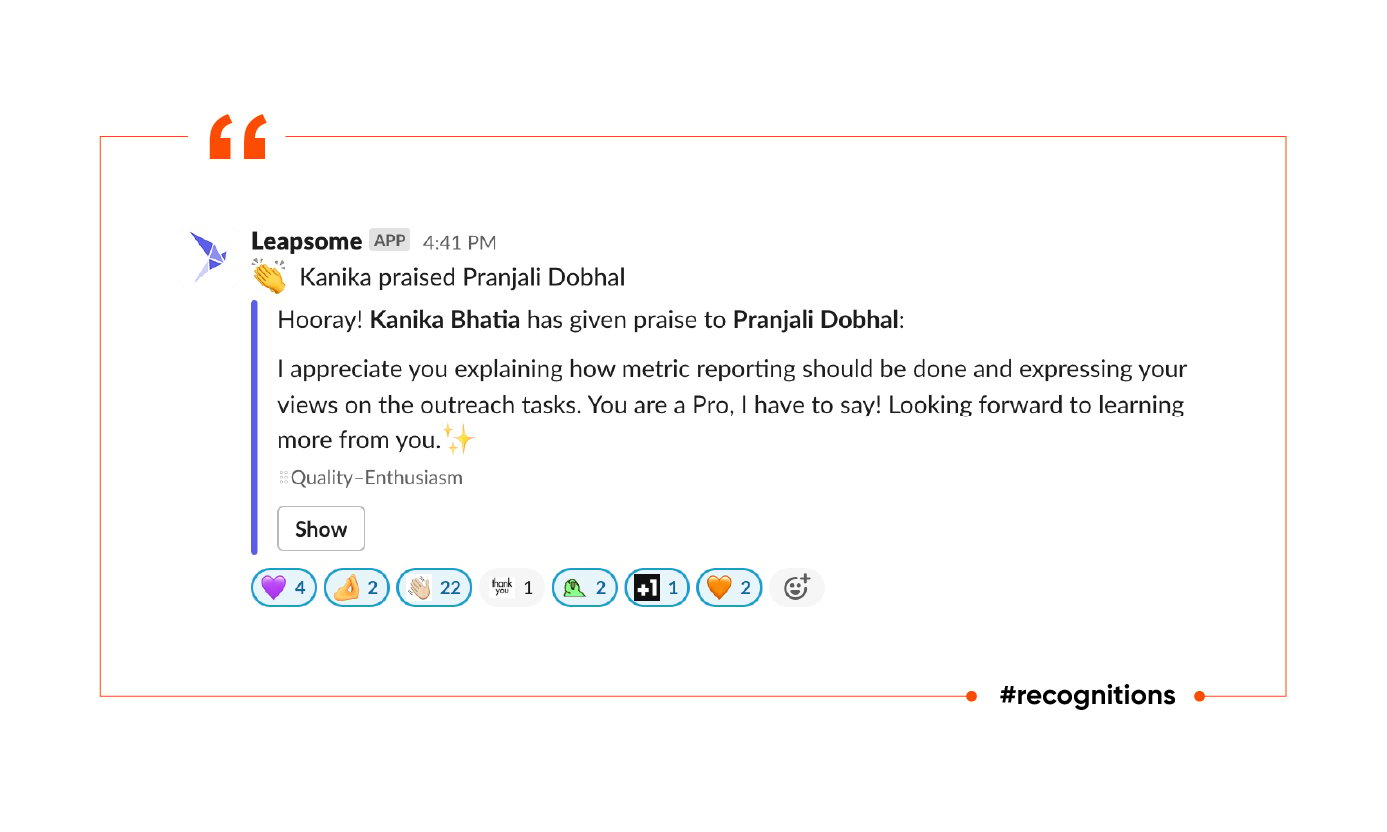
According to James Clear, author of ‘Atomic Habits,’ every habit that our brain forms goes through four stages.
The final stage is that of a reward, without which the brain stops craving for that habit. Eventually, the initial enthusiasm that gets one started on a new habit fizzles out.
Imagine getting recognized openly, organization-wide, by your colleagues whenever you did something well—even if that something was a part of your work.
Putting in your best work would be immediately rewarding, making you a master of your craft in the long run.
Through People-First Approach
Unfortunately, the phrase “people-first” is becoming an empty cliché, a shiny sticker that feels good to have—as long as there’s no investment involved.
An organization thrives when its people (team members and clients) do so, too.
Yet, there's an embarrassing gulf between saying that we put our people first and doing it.
We’ve crafted every Axelerant benefit to make our team members thrive in their professional and personal lives.
Incidentally, team members rated flexibility to work when and where they want as the biggest benefit.
By Exchanging Feedback From A Place Of Care
During the two-week onboarding, performance coaches help new joiners understand what it means to exchange feedback.
"Feedback comes from a place of care. It's an act of kindness," shared Nanditha.
At Axelerant, people share (and receive) feedback to help each other become remarkable at what they do, and become aware of their blind spots.
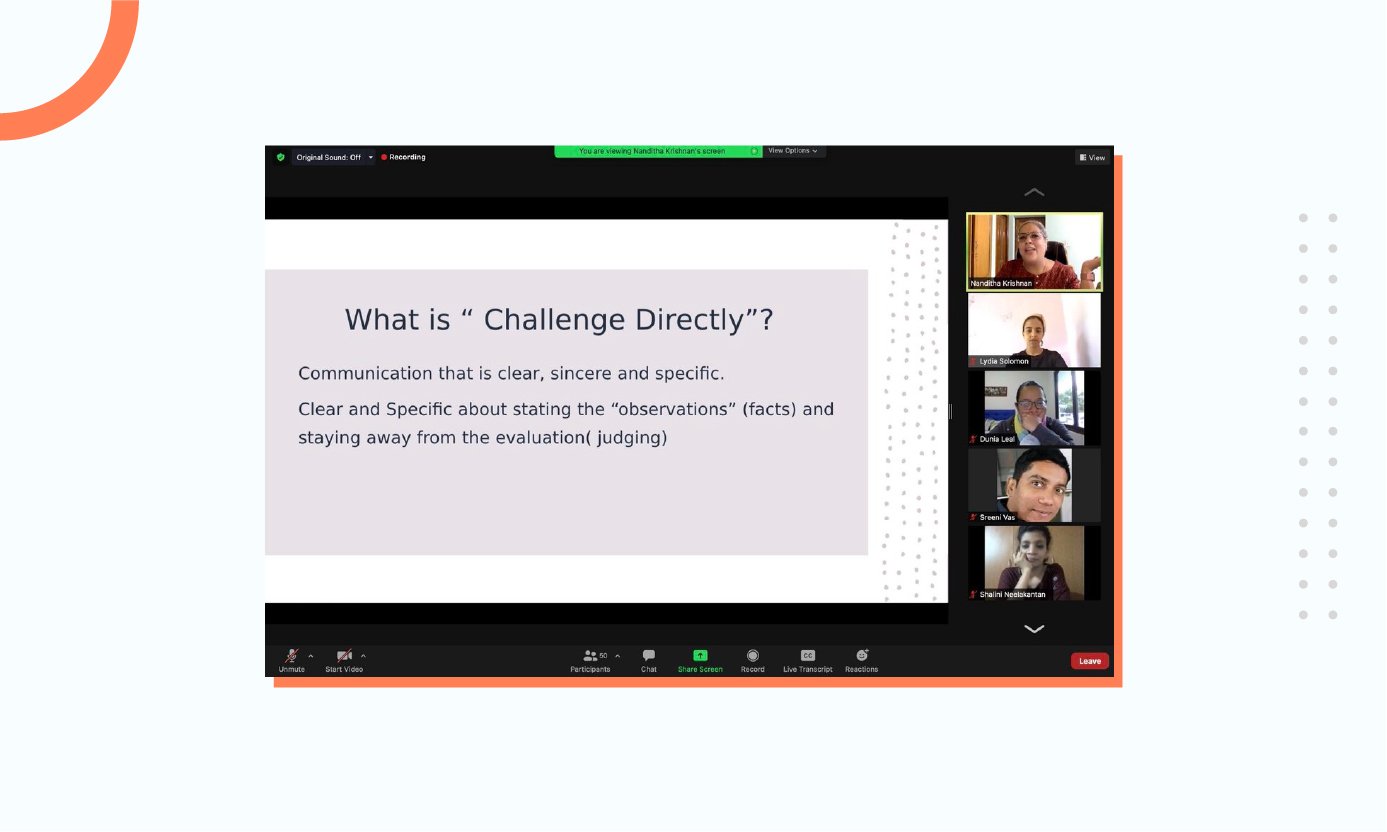
"Every feedback must be timely and delivered with kindness," shared Nanditha during a coaching session on receiving feedback.
And Living Our Core Values Every Single Day
We follow our core values in everything we do—from conducting interviews to creating premium solutions and websites for clients like the United Nations, Stanford University, and Blue State.
"Interviewing at Axelerant after a career break was completely different from interviewing at the top tech companies in India. I could tell that people here live their organizational values," shared Sujatha Varadharajan, Axelerant Business Analyst.
It is a challenge to breathe radical candor to life in an organization, one that demands rigorous effort.
But creating something positive and of high value is never easy, least of all a caring, fearless culture.
At Axelerant, we understand that.
And we also understand how rewarding it can be to see people be happy and passionate towards not just their work, but to life outside of it.


Rohit Ganguly, Content Marketer
Rohit is a content marketer first and a YouTuber second. He loves to interact with animals, feed them, clean his apartment, and spend time with friends and family. Curious by nature, he also enjoys literature, movies, meditation, and calligraphy.

 We respect your privacy. Your information is safe.
We respect your privacy. Your information is safe.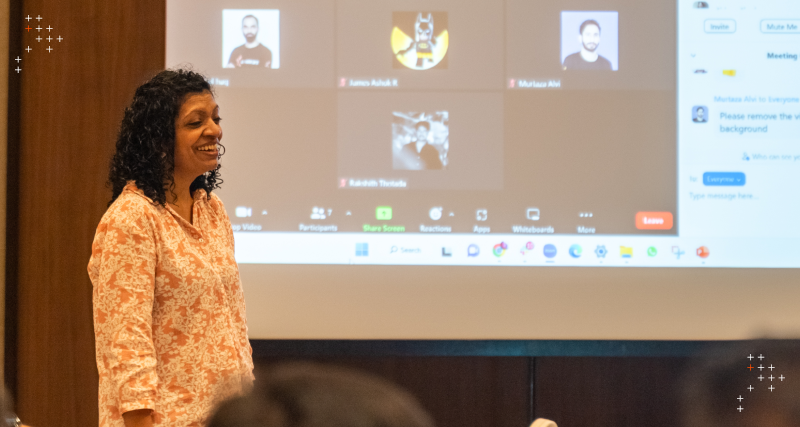



Leave us a comment